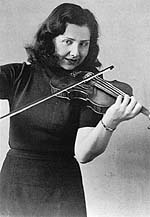

A prisoner herself, Alma Rosé conducted the Women's Orchestra at Auschwitz.
MILLIGAN COLLEGE, TN - Dr. Kellie Brown, chair of the Milligan College music department, will present her research on orchestras in concentration camps at the American String Teachers Association (ASTA) National Conference in Kansas City, Mo., on Thursday, March 17, 2011.
Brown's presentation is titled Alma Rosé and the Women's Orchestra at Auschwitz: Lessons for Our Students on Tolerance and the Triumph of the Human Spirit. Her research focuses on Rosé, a woman whose music brought a glimpse of beauty and hope to hundreds of Auschwitz prisoners and even saved the lives of some of the musicians.
"The study of those who have gone before us and made their indelible mark on history, especially if it was through great personal sacrifice, is a worthy pursuit," said Brown. "I think any time that type of subject can be part of an ensemble's curriculum where students can learn more than just the notes, it is beneficial."
Rosé was the niece of the composer Gustav Mahler and the daughter of renowned violinist Arnold Rosé who founded the Rosé String Quartet. Rosé was a successful violinist with a charmed life, but all that changed in 1938 when the Nazis took control of Austria, her homeland. Rosé's Jewish heritage made her a Nazi target, and she was eventually arrested and sent to Auschwitz in July 1943.
Despite all of the horrors associated with Auschwitz, Rosé soon discovered the camp's orchestra. Her fame and her family's reputation made Rosé the ideal candidate to conduct the women's orchestra which, at the time, was a rag-tag of women prisoners. Rosé's arrival ignited the orchestra's success and respect, and it quickly grew to 50 members. Not only did orchestra members find hope through the music, but their value among the SS guards gave Rosé the leverage to insist members were treated with decency. In this way, Rosé was able to save women's lives through music.
Brown's interest in this topic was a long time in the making. Sparked by a novel about a Jewish violinist living in WWII Germany, Brown became interested in the lives of famous musicians during the Holocaust. After watching the movie, Playing for Time, which tells the story of the women's orchestra in Auschwitz, Brown began her research on the life of Rosé.
Brown's lecture will provide the historical details about Rosé and the Women's Orchestra at Auschwitz. She will discuss the importance of incorporating this topic into the orchestra curriculum. In November 2009, Brown's article, Remembering Alma Rosé and the Women's Orchestra at Auschwitz, was published in American String Teacher.
Brown serves as director of the strings program and conductor of the Milligan College Orchestra. She is a frequent clinician and performer, and serves as the assistant conductor of the Johnson City Symphony Orchestra and assistant concertmaster for the Symphony of the Mountains.
In addition, she has written numerous compositions, arrangements and articles. In 2005 her first book, An Annotated Bibliography of Musical Fiction, was published by Edwin Mellen Press. Brown has studied at Furman University, East Tennessee State University and Appalachian State University and holds a bachelor's degree in music education, a master's degree in violin performance, and a doctoral degree in higher education administration, with an emphasis in music administration.
The ASTA National Conference is held yearly to benefit string teachers, students and performers. The conference provides opportunities to learn the latest teaching techniques and gain important information that will benefit students. The ASTA conference is the premier place to enhance skills and knowledge through sessions on pedagogy, string literature, college curriculum and more. Other topics on which Brown has presented in the past include "Incorporating the Elective Student in the College String Curriculum" and "Technology for the String Teacher."
For more information, contact the Milligan College music department at 423.461.8723 or music@milligan.edu.